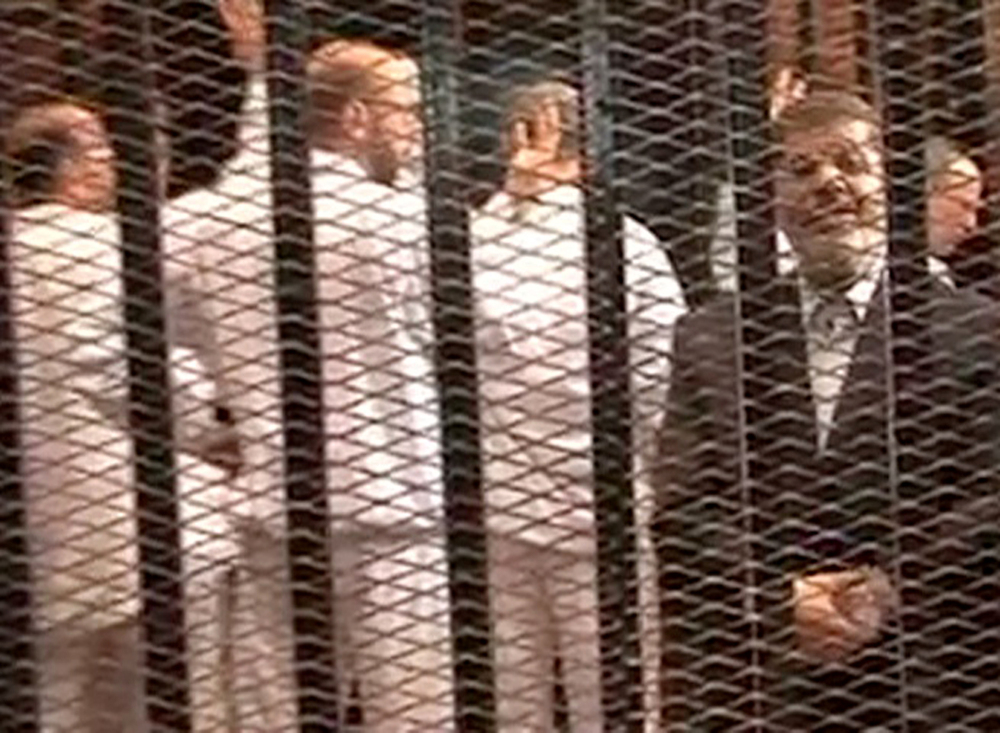CAIRO — Egypt’s crackdown on Islamists has jailed 16,000 people over the past eight months in the country’s biggest round-up in nearly two decades, according to previously unreleased figures from security officials.
Rights activists say reports of abuses in prisons are mounting, with prisoners describing systematic beatings and miserable conditions for dozens packed into tiny cells.
The Egyptian government has not released official numbers for those arrested in the sweeps since the military ousted Islamist President Mohammed Morsi in July. But four senior officials – two from the Interior Ministry and two from the military – gave The Associated Press a count of 16,000, including about 3,000 top or midlevel members of Morsi’s Muslim Brotherhood.
The count, which is consistent with recent estimates by human rights groups, was based on a tally kept by the Interior Ministry to which the military also has access. It includes hundreds of women and minors, though the officials could not give exact figures. The officials gave the figures to the AP on condition of anonymity because the government has not released them.
The flood of arrests has swamped prisons and the legal system. Many are held for months in police station lockups meant as temporary holding areas or in impromptu jails set up in police training camps because prisons are overcrowded. Inmates are kept for months without charge.
“My son looks like a caveman now. His hair and nails are long, he has a beard and he is unclean,” said Nagham Omar, describing to the AP the conditions that her 20-year-old son Salahideen Ayman Mohammed has endured since his arrest in January while participating in a pro-Morsi protest. He and 22 others are crammed in a 9-by-9-foot cell in a police station in the southern city of Assiut, said Omar, who visits him once a week. Mohammed has not yet been charged.
“He is my son, but the stench in that place makes me want to leave immediately,” she said.
The government says the police, run by the Interior Ministry, have changed their ways from the era of autocrat Hosni Mubarak, when the security forces became notorious for torture and corruption. Now, officials say, there is no tolerance for abuses.
The assistant interior minister for human rights, Maj. Gen. Abu Bakr Abdel-Karim, told the newspaper Al-Watan in an interview last month that “it is possible that there is some use of cruelty” and said anyone claiming to be maltreated should file a complaint with either the ministry or the general prosecutors’ office. But he said so far there had been no proof presented of maltreatment.
The new military-backed government is determined to crush the Muslim Brotherhood and its Islamist allies. It presents the campaign as a fight against terrorism, accusing the group of cooperating with Islamic militants in a wave of bombings and assassinations since Morsi’s ouster. The violence has killed dozens of police and soldiers.
The Brotherhood denies any link to the militants, and says authorities are using terrorism as an excuse to eliminate the group as a political rival. Some 2,000 Brotherhood supporters have been killed by police in crackdowns on pro-Morsi protests that Islamists have held for months around the country.
Hatred of police abuses was a major factor fueling the 2011 uprising that overthrew Mubarak. However, the new arrests have seen broad support among the public amid a wave of nationalist feeling. Millions rose up in protests last summer demanding Morsi’s removal before the military ousted him.
Send questions/comments to the editors.



Success. Please wait for the page to reload. If the page does not reload within 5 seconds, please refresh the page.
Enter your email and password to access comments.
Hi, to comment on stories you must . This profile is in addition to your subscription and website login.
Already have a commenting profile? .
Invalid username/password.
Please check your email to confirm and complete your registration.
Only subscribers are eligible to post comments. Please subscribe or login first for digital access. Here’s why.
Use the form below to reset your password. When you've submitted your account email, we will send an email with a reset code.